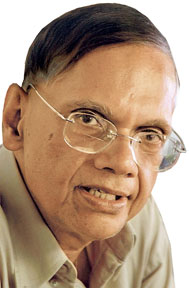Sri Lanka’s experience and its lessons for the world
Text of the speech by External Affairs
Minister Prof G L Peiris at the China Institute of International
Studies, Beijing on August 12, 2010. Prof Peiris was elected a
Distinguished Fellow of the Institute
Sri Lanka, at the time we received Independence from the British in
1948, was regarded as a model for economic development in the whole
Commonwealth. We were so described as by no less a figure than Li Kwan
Yu, the architect of modern Singapore, in his famous autobiography “The
Singapore Story: From Third World to First”. In that book he says that
in the early years, in his public speeches, he used to ask the question,
why cannot Singapore develop like Ceylon, as the country was then
called?
 |
|
Minister
Prof G L Peiris |
In the late 40s and the early 50s Ceylon had the highest per capita
income in South Asia. We were ahead of Malaya, ahead of Thailand, ahead
of Korea and we were just a few dollars behind Japan.
What held us back thereafter was one problem and that was the problem
of terrorism. Whatever we tried to do during that period, however hard
we tried, however pragmatic our policies were, there was a point beyond
which we could not succeed, with regard to investment, with regard to
trade or tourism because of the violence in the country.
Battlefield
The difference now is that this constraint has been consigned to the
past, our country has been able to eradicate terrorism. It might seem to
you and indeed it is, a singular achievement. It is, therefore, worth
pausing to reflect for a moment on how this became possible, because the
gloomy prophesy that we heard all too often from the international
community, was that it was simply not possible to prevail against the
Libration Tigers of Tamil Eelam in the battle field.
We were told, no doubt with good intentions, by countries which had a
whole reservoir of military expertise, that terrorism could not be
defeated militarily. The experience of Sri Lanka demonstrates the
contrary, so the question is, how was it possible for a small country
with very limited resources, with a small Army, Navy and Air Force to
succeed, where other larger countries with far more substantial
resources at their command, failed? What is the explanation of this
remarkable phenomenon?
I think there are certain lessons of universal validity which can be
learnt from the contemporary Sri Lankan experience.
One of the most important lessons is that, if you are to succeed in
an endeavour of this kind, the effort has to be made by the country
itself. There is no way that you can call in the armies of another
country.
To be continued
|



